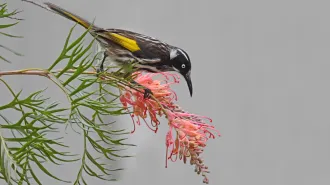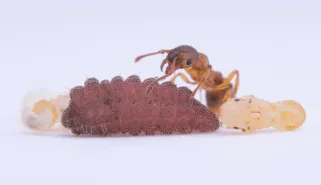When testosterone begins spiking in young Asian bull elephants, they secrete a liquid from their facial glands that smells like honey, says an international team of researchers.

Ancient Hindu poetry referred to bees gathering “sweetness” from elephants, but a paper in the Feb. 28 Nature represents the first scientific description of the phenomenon and its possible function, says coauthor L.E.L. Rasmussen of Oregon Health and Science University in Beaverton.
She says she first heard about the honey-scented secretions from Heidi Riddle, who runs an elephant sanctuary in Greenbrier, Ark., and is a coauthor on the report. One of Riddle’s Asian bulls was just reaching adulthood and displaying a junior version of musth, the weeks-long phase of testiness and heightened interest in mating that characterizes adult males (SN: 11/25/00,
p. 341). Musth is typically the only time an Asian elephant secretes much liquid from glands on its temples.
A maturing male doesn’t go into full musth all at once but starts with sporadic days of erratic behavior and quick spikes in testosterone concentration in his blood. Rasmussen analyzed samples of secretions from young males and found compounds known from bee honey and bee pheromones. These compounds dwindle in musth secretions as the males mature, while other, pungent compounds appear.
The researchers hypothesize that the honeylike scent in a youngster’s secretions indicates to its elders that this sexually mature male is still basically a kid.
Rasmussen tested captive elephants’ reactions to gland secretions by pouring them on recently washed concrete flooring. Mature males didn’t pay much attention to the secretions of the youngsters, but young males grew agitated when sniffing samples from adults.
Observations in the wild were consistent with that pattern, the team reports. At a foraging spot in India, a mature bull sniffed in the direction of a young male secreting the honey scent. The adult bull didn’t pursue the youngster but stalked and attacked a slightly older elephant already secreting some of the grown-up compounds. The honey-scented compound may deter attacks from older males, Rasmussen proposes.
“I’ve never even heard this hypothesized before,” says John Lehnhardt, an elephant specialist at Disney’s Animal Kingdom in Lake Buena Vista, Fla.
Jill Mellen, a behaviorist there, says it’s important to ask which animals would benefit from the sweet secretions. Perhaps they save the youngsters from battle while they present no mating competition. On the other hand, the youngsters’ secretion might let them slip by big bulls for sneaky courtships.
Although only male Asian elephants exhibit musth, both males and females of African elephants secrete liquids from their temples, says chemist Thomas Goodwin of Hendrix College in Conway, Arkansas. He’s examining these secretions to see if elephant bulls have their own special chemicals in Africa, too.






